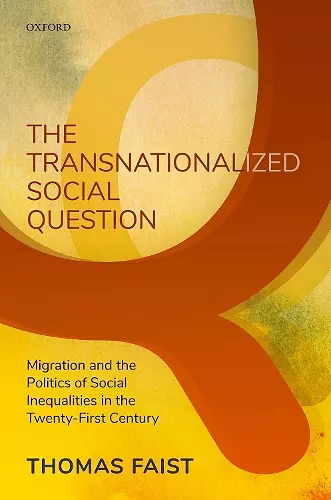The Transnationalized Social Question
Migration and the Politics of Social Inequalities in the Twenty-First Century
Format:Hardback
Publisher:Oxford University Press
Published:28th Dec '18
Currently unavailable, and unfortunately no date known when it will be back

The social question is back. Yet today's social question is not primarily between labour and capital, as it was in the nineteenth century and throughout much of the twentieth. The contemporary social question is located at the interstices between the global South and the global North. It finds its expression in movements of people, seeking a better life or fleeing unsustainable social, political, economic, and ecological conditions. It is transnationalized not only because migrants and their significant others entertain ties across the borders of national states, staying in touch with family and friends, receiving or sending financial remittances in transnational social spaces. Also of importance are cross--border recruitment schemes for workers and the cross-border diffusion of norms appealed to in the case of migration--for example, the social right to decent work as a human right. Moreover, migration can become an issue of inclusion or exclusion in fields important to life chances in the emigration, transit, or immigration states--a transnationalization of national states. And, as in the nineteenth century, political conflicts arise, constituting the social question as a public concern. In earlier periods class differences dominated conflicts. While class has always been criss-crossed by manifold heterogeneities, not least of all cultural ones around ethnicity, religion, and language, it is these latter heterogeneities that have sharpened in situations of immigration and emigration over the past decades. Casting a wide net in terms of conceptual and empirical scope, this book tackles both the social structure and the politics of social inequalities. It sets a comprehensive agenda for research which also includes the public role of social scientists in dealing with the transnationalized social question.
The transnationalized social question is a remarkable and very original book, analyzing migration movements between the Global South and the Global North from the point of view of social gaps. Exit, as a response to global inequalities, takes place in a world where social inequalities between countries are stronger than inequalities inside the countries. Cross border migration is a crucial field for understanding social inequalities in the context of transnationalization of labour and global asymmetries. The choice of Thomas Faist to explore the whole migration complex through the transnational approach of social questions is a brilliant renewal of research. The final claim towards researchers to engage in the public sphere is an urgent request when decision makers have difficultly agreeing with them on the solutions. * Professor Catherine Wihtol de Wenden, Science Po, CNRS, Paris *
Thomas Faist has provided a brilliant and valuable reflection on several issues of the current debates in social sciences with this book: not only migration as an increasing selective form of human mobility, but also social inequalities, North-South relations on a global scale, transnational social protection, the environmental issues. Faist, among several other relevant topics, addresses convincingly the crucial role of location and borders for social inequalities, the rising cultural conflicts beyond socio-economic cleavages, the design of internal boundaries as forms of domination and exclusion. This book will remain a cornerstone of the intellectual debate on the relationship between international migrations and the main social issues of our time, and I hope it will become an essential guide for the new generation of social scientists. * Professor Maurizio Ambrosini, University of Milan *
ISBN: 9780199249015
Dimensions: 241mm x 164mm x 29mm
Weight: 752g
390 pages